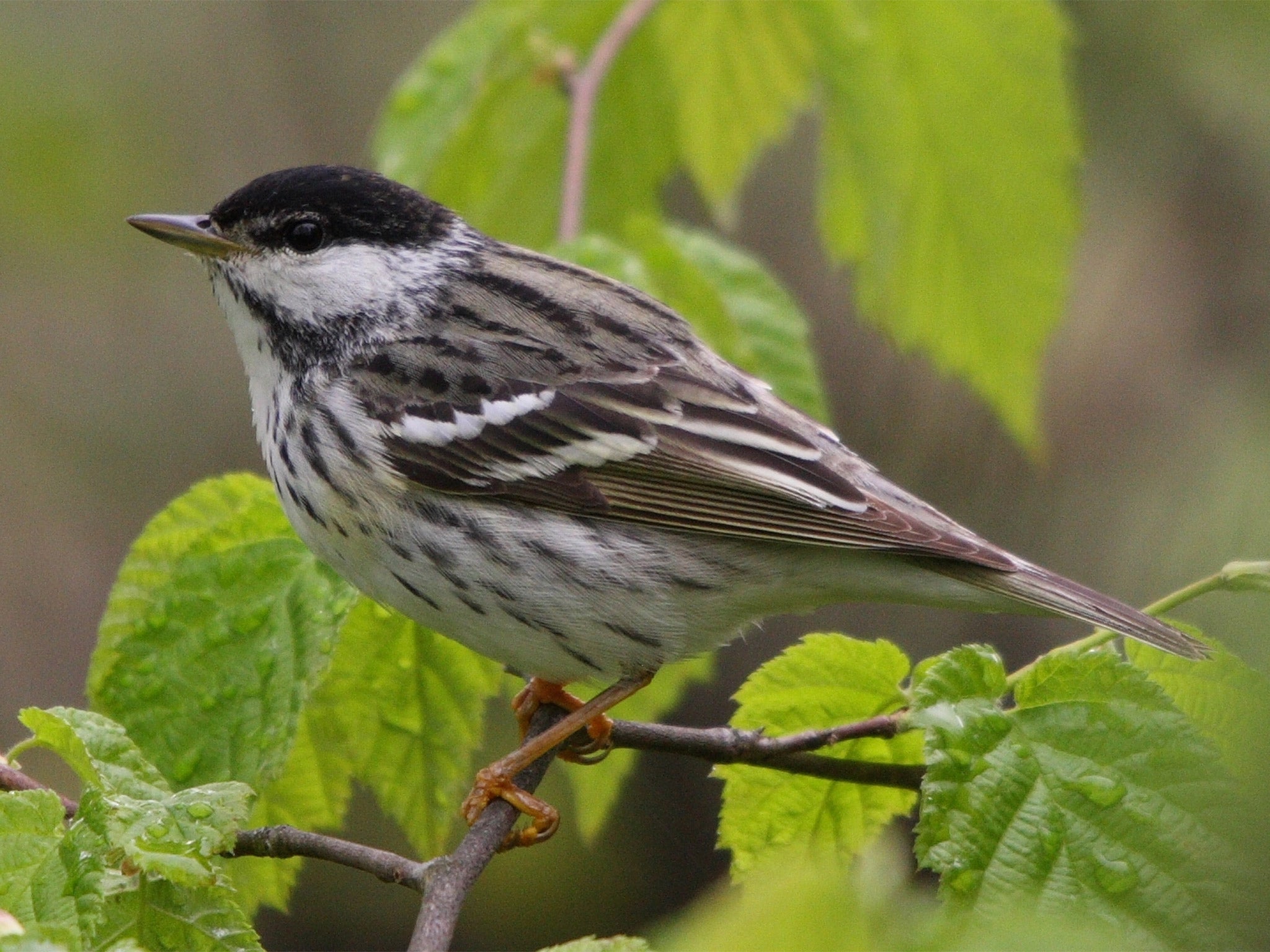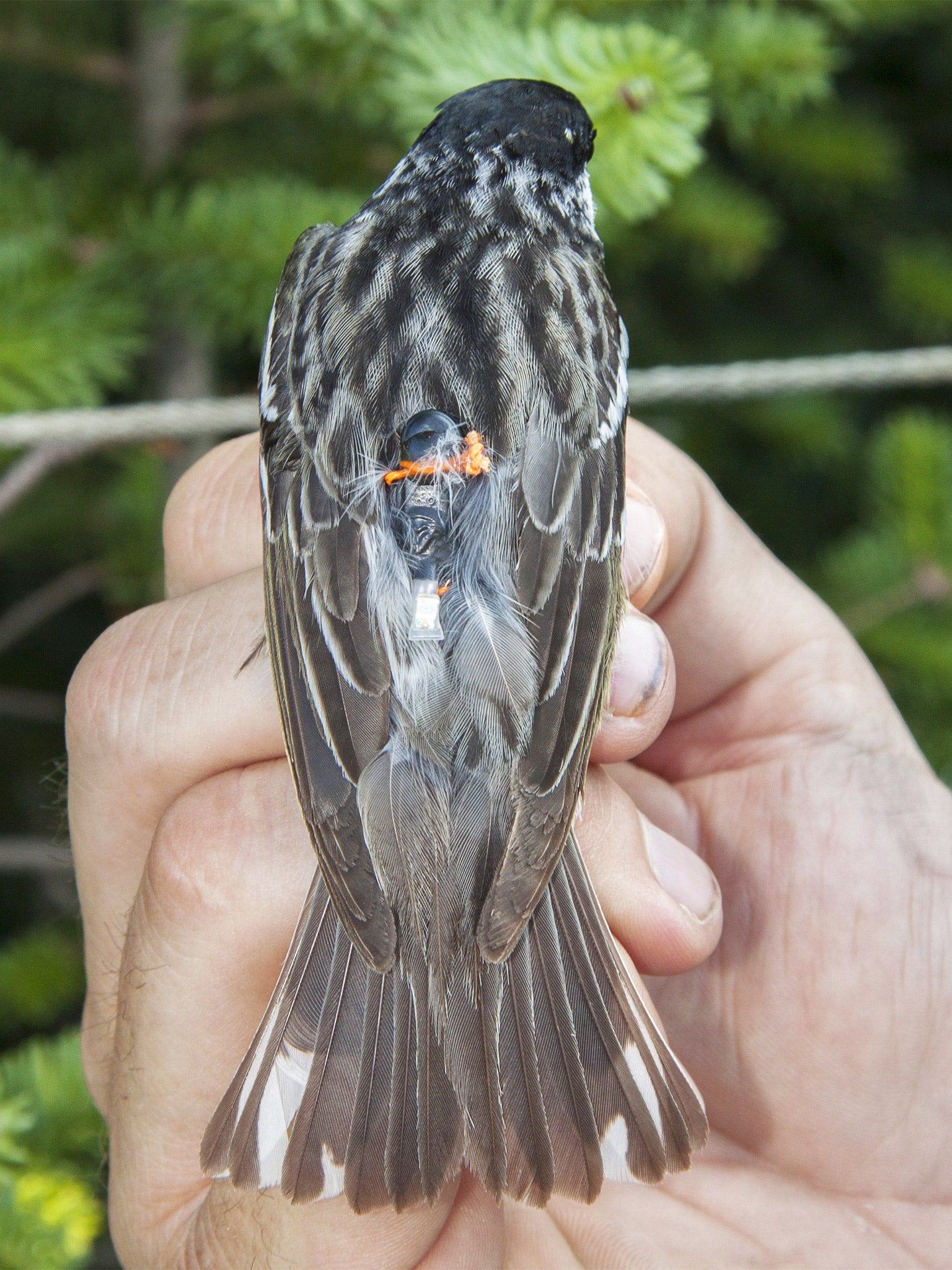The small songbird that travels 1,700 miles in non stop flight lasting three days
Scientists said that the annual open-water flight of the tiny blackpol warbler is one of the greatest migratory journeys on earth

Your support helps us to tell the story
From reproductive rights to climate change to Big Tech, The Independent is on the ground when the story is developing. Whether it's investigating the financials of Elon Musk's pro-Trump PAC or producing our latest documentary, 'The A Word', which shines a light on the American women fighting for reproductive rights, we know how important it is to parse out the facts from the messaging.
At such a critical moment in US history, we need reporters on the ground. Your donation allows us to keep sending journalists to speak to both sides of the story.
The Independent is trusted by Americans across the entire political spectrum. And unlike many other quality news outlets, we choose not to lock Americans out of our reporting and analysis with paywalls. We believe quality journalism should be available to everyone, paid for by those who can afford it.
Your support makes all the difference.A small songbird no bigger than a sparrow flies 1,700 miles over open ocean in a non-stop flight lasting less than three days, a study has found.
Scientists said that the annual open-water flight of the tiny blackpoll warbler from the north-east corner of North America to the forests of South America is one of the greatest migratory journeys on earth.
It was thought that the songbird, which spends summer in the boreal forests of Canada and the United States before heading south for the winter, flies overland down the eastern coast of America, stopping on its way to rest and feed.

However, a study involving miniature electronic backpacks to monitor the birds’ movements has revealed that the blackpoll warbler simply flies due south over open water without stopping until it reaches landfall in the Caribbean about two or three days later, before flying on to Venezuela and Colombia.
We're really excited to report that this is one of the longest non-stop overwater flights ever recorded for a songbird, and finally confirms what has long been believed to be one of the most extraordinary migratory feats on the planet,” said Bill DeLuca of the University of Massachusetts Amherst, the first author of the study published in the journal Biology Letters.
Seabirds such as the Arctic tern and albatross are known to migrate many hundreds of miles over open sea but it is unusual for such a small songbird which weighs only 12 grams and normally lives in woodlands to fly for so long over the ocean, Dr DeLuca said.
“For small songbirds, we are only just now beginning to understand the migratory routes that connect temperate breeding grounds to tropical wintering areas,” he said.
The warbler is too small to carry conventional tracking devices so it was fitted with a small, lightweight recorder to monitor the time of sunrise and sunset, which allowed the scientists to estimate its precise longitude and latitude over a given time period.
The scientists fitted the recording backpacks to 20 warblers before they flew south for the winter and managed to retrieve the devices from five individuals during the following breeding season,
“When we accessed the locators, we saw the blackpolls' journey was indeed directly over the Atlantic. The distances travelled ranged from 2,270 to 2,770 km,” said DeLuca.
“It was pretty thrilling to get the return birds back, because their migratory feat in itself is on the brink of impossibility. We worried that stacking one more tiny card against their success might result in them being unable to complete the migration,” Dr DeLuca said.
“Many migratory songbirds, blackpolls included, are experiencing alarming population declines for a variety of reasons, if we can learn more about where these birds spend their time, particularly during the nonbreeding season, we can begin to examine and address what might be causing the declines,” he said.
The scientists suggested that the birds use the quicker, over-sea route rather than the longer, coastal path because there are fewer overall risks in making a shorter journey compared to a longer trip over land.
"They eat as much as possible, in some cases doubling their body mass in fat so they can fly without needing food or water. For blackpolls, they don't have the option of failing or coming up a bit short. It's a fly-or-die journey that requires so much energy,” said Ryan Norris of the University of Guelph, the team leader.
“These birds come back every spring very close to the same place they used in the previous breeding season, so with any luck you can catch them again. Of course there is high mortality among migrating songbirds on such a long journey, we believe only about half return," Dr Norris said.
Grahame Madge, spokesman for the Royal Society for the Protection of Birds, said that the blackpol warbler is one of the most frequently sighted North American songbirds seen in Britain.
“This is an exciting time for scientists studying bird migration and they are making some amazing discoveries, partly helped by the miniaturisation of technology, allowing the movements of tiny songbirds to be tracked,” Mr Madge said.
“This leap in capability is giving us a fascinating insight into bird migration at a time when many migratory birds are facing a conservation crisis with some species declining hugely. The more we understand about the movement of birds, the better we are able to protect them,” he said.
“We have much to learn about the movements of migratory birds this side of the Atlantic too.”
Join our commenting forum
Join thought-provoking conversations, follow other Independent readers and see their replies
Comments